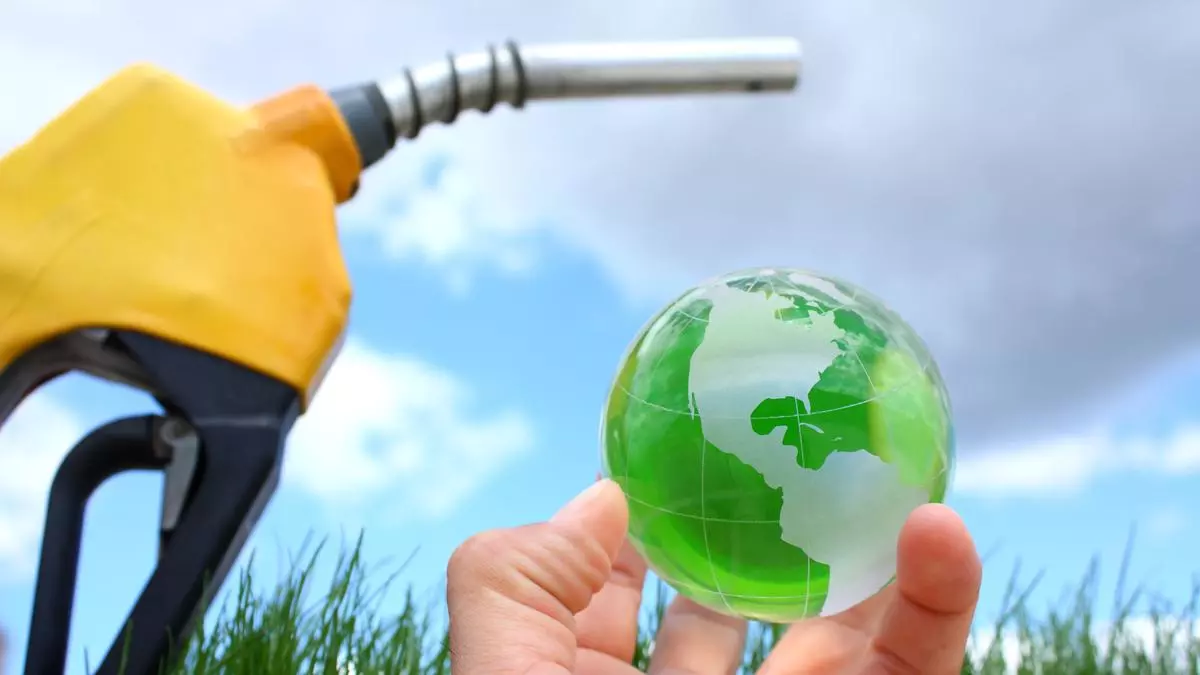Latest News
To understand Trump and Biden, look to Reagan and Carter
Last Updated: Jan 03, 2025, 08:00:00 AM ISTAs Donald Trump prepares to reverse Joe Biden's climate initiatives, a historical parallel emerges with Ronald Reagan's undoing of Jimmy Carter's environmental policies. Despite setbacks, Carter's advances in clean energy and the EPA have lasting impacts, underlining their importance in the ongoing transition to renewable power and environmental preservation.
Oil rises from two-month highs on optimism over policy support for growth
Last Updated: Jan 03, 2025, 07:39:00 AM ISTOil prices continue to rise, reaching their highest levels in over two months due to anticipated government policies aimed at reviving economic growth worldwide. Lower interest rates and China’s proactive measures are expected to stimulate fuel demand. Additionally, a potential cold snap in the U.S. and Europe may increase diesel demand.
Joe Biden issues major coastal protection before Trump handover
Last Updated: Jan 06, 2025, 03:58:00 PM ISTUS President Joe Biden has banned offshore drilling across the entire Atlantic and Pacific coasts, as well as parts of the Gulf of Mexico and Bering Sea. This action, aimed at protecting over 625 million acres of waters, is part of efforts to transition to a clean energy economy and address the climate crisis.
IOC shares in focus as co to provide fueling services at Noida International Airport
Last Updated: Jan 03, 2025, 09:03:00 AM ISTUnder a 30-year concession agreement, IOC will operate fuel stations at three key locations within the airport: near the main western access road for passengers, at the airside for airport operations, and close to the eastern cargo precinct, as reported by ET earlier.
Donald Trump royally frustrated as Joe Biden uses 72-year-old law to give the President-elect a slap in the face
Last Updated: Jan 08, 2025, 02:59:00 AM ISTRecent reports have revealed that US President Joe Biden have permanently banned a latest offshore oil and gas drilling at the US coastal waters by using a 72 year old law which eventually includes the entire East Coast. Speculations are on the rise that this certain move by Joe Biden has come as a blow for US President-elect Donald Trump before he is all set to take the office again.
Prices of tomato, potato in bitter taste; home-cooked meals get costlier in December: Report
Last Updated: Jan 06, 2025, 05:25:00 PM ISTPrices of home-cooked meals rose in December due to dearer tomato and potato prices. The average cost of preparing a vegetarian thali increased by 6 percent compared to last year. The cost of a non-vegetarian thali rose by 12 percent. Tomato and potato prices surged, while broiler costs also contributed to the increase.
Rising domestic demand for petrol, diesel to offset compressed GRMs in FY26
Updated - January 03, 2025 at 12:34 PM. |India Ratings and Research (Ind-Ra) expects GRMs to remain subdued during FY26, similar to H1 FY25, on account of slowing global consumer and industrial demand, particularly in China
India’s refined petroleum product exports rose in October aided by petrol and jet fuel
Updated - December 15, 2024 at 09:47 PM. |India’s refined petroleum product exports increased by 20 per cent year-on-year in October 2024, says Xavier Tang, Market Analyst at Vortexa
Nayara Energy to expand retail network by adding a fuel station per day
Last Updated: Jan 05, 2025, 10:41:00 AM ISTNayara Energy plans to add 400 petrol pumps this year, expanding its network of 6,500+ outlets across India. The firm aims to grow its retail presence in states like Gujarat, Maharashtra, Tamil Nadu, and Rajasthan, and invites new dealership applications to boost local entrepreneurship.
Oil hovers at highest since Oct on cold weather, China stimulus
Last Updated: Jan 06, 2025, 07:22:00 AM ISTOil prices reached their highest levels since October as colder weather in the Northern Hemisphere and Beijing's economic stimulus measures boosted global fuel demand. Brent crude futures rose to $76.66 per barrel, while U.S. West Texas Intermediate crude reached $74.18 per barrel.
New e-truck incentive plan may not have many takers
Last Updated: Jan 03, 2025, 12:06:00 AM ISTThe scheme also allows a consumer who did not previously own a truck to get a scrapping certificate from someone else to avail the incentives while buying. The incentive amount for e-trucks is likely to be announced later this month. Girish Wagh, executive director, Tata Motors, said initiatives like the PM E-Drive provide the much-needed push for EV adoption in the M&HCV segment by "fostering industry confidence and accelerating investments in cleaner technologies."
Petrol, diesel sales soar on holiday travel
January 02, 2025India's petrol and diesel consumption soared in December 2024 as holiday travel boosted demand, reversing the fall witnessed in previous months, preliminary data of state-owned fuel retailers showed on Wednesday.
ATF price cut by 1.5%, commercial LPG rates down Rs 14.5 per cylinder
Last Updated: Jan 01, 2025, 01:14:00 PM ISTJet fuel prices were reduced by 1.5 percent and commercial LPG prices by Rs 14.5 per 19-kg cylinder in January. Cooking gas prices for households remain unchanged. The last price cut for petrol and diesel was in mid-March. Prices of ATF and LPG may vary by state. Oil corporations revise fuel prices on the first of each month.
India Inc seeks cut in personal income tax rates, flags dumping by China at pre-Budget meet
Last Updated: Dec 30, 2024, 05:53:00 PM ISTIndustry bodies have urged the Finance Minister to consider reducing personal income tax rates, lowering excise duty on fuel, and implementing measures to boost employment-intensive sectors in the upcoming budget. Concerns about Chinese product dumping, food security, and inflation due to climate change were also highlighted.
Refex Renewables & Infrastructure arm acquires 51% stake in Vyzag Bio
Last Updated: Dec 30, 2024, 05:51:00 PM ISTRefex Renewables & Infrastructure on Monday said its arm Refex Sustainability Solutions Ltd (RSSL) has completed acquisition of 51 per cent stake in Vyzag Bio-Energy Fuel.
Petrol, diesel sales soar on holiday travel
Last Updated: Jan 01, 2025, 05:38:00 PM ISTIndia's petrol and diesel consumption increased in December 2024 due to holiday travel. Petrol sales rose 9.8 per cent and diesel demand was up 4.9 per cent from the previous year. Fuel demand also increased due to agriculture activities. This rise continues the trend of growth seen in November 2024 despite the tepid monsoon months.
India cut GDP emission intensity by 36 pc during 2005-2020: Govt report
Last Updated: Jan 01, 2025, 08:38:00 PM ISTIndia's greenhouse gas emissions dropped by 7.93% in 2020 compared to 2019, and the emission intensity of its GDP declined by 36% between 2005 and 2020. India aims to further reduce GDP emission intensity by 45% by 2030 and achieve 50% electric power from non-fossil fuels.
Oil rises on expanding Chinese factory activity, but set to end year lower
Last Updated: Dec 31, 2024, 07:52:00 AM ISTOil prices increased due to China's expanded manufacturing activity in December. Brent crude futures increased to $74.46 a barrel and U.S. West Texas Intermediate crude to $71.48 a barrel. Brent declined 3.2%, and WTI was down 0.6% for the year. Declining U.S. crude stockpiles provided short-term support.
IOCL to provide fueling services at Noida International Airport
Last Updated: Jan 02, 2025, 01:59:00 PM ISTIndian Oil Corporation (IOCL) will provide fuel services at Noida International Airport (NIA) in Jewar, Uttar Pradesh, under a 30-year concession agreement. IOCL will operate three fuel stations at different strategic locations within the airport, ensuring seamless and efficient fueling services as the airport prepares for its inauguration early next fiscal.
Budget 2025: Cut IT rates, hand out vouchers to drive consumption, urges CII
Last Updated: Dec 30, 2024, 12:25:00 AM ISTThe Confederation of Indian Industry (CII) recommends personal income tax cuts and excise duty reduction on fuel to enhance disposable incomes and stimulate spending. They also propose increasing daily wages under MGNREGA and payouts under PM-Kisan. Engineering Exports Promotion Council (EEPC) suggests a faceless GST audit system to aid MSMEs in reducing compliance costs and focusing on growth.
India initiates anti-dumping probe into LNG fuel tanks imports from China
Last Updated: Dec 26, 2024, 03:58:00 PM ISTIndia is investigating allegations of dumping LNG fuel tanks from China after a domestic company complained. The investigation could lead to anti-dumping duties if it finds that cheap imports are hurting local manufacturers. These tanks are important for large vehicles and the case is being examined by the Directorate General of Trade Remedies.
Budget 2025-26: CII calls for cut in excise duty on fuel, consumption vouchers to stir demand
Last Updated: Dec 29, 2024, 05:43:00 PM ISTUnion Budget: CII recommends lowering excise duty on fuel to boost consumption, reduce inflation, and increase disposable income in its pre-budget suggestions for 2025-26. The proposal includes reducing marginal tax rates for incomes up to Rs 20 lakh and increasing benefits under key government schemes to enhance rural recovery.
Climate change led to 41 additional days of extreme heat in 2024: Report
Last Updated: Dec 27, 2024, 11:28:00 AM ISTClimate change led to an average of 41 more days of extreme heat in 2024, making it the warmest year on record. The year witnessed 219 extreme weather events, 3,700 deaths, and millions displaced. To avoid further devastation, transitioning away from fossil fuels is crucial, as current policies may increase global warming to 3 degrees Celsius by 2100.
Black Sea oil spill: Russia declares emergency; here's what happened
Last Updated: Dec 27, 2024, 06:51:00 PM ISTThe Black Sea oil spill has become a major environmental disaster, forcing Russia to declare a federal emergency.
NTPC REL begins commercial supply of 37.50 MW from Sadla solar project
Last Updated: Dec 27, 2024, 12:58:00 PM ISTNTPC's subsidiary, NTPC Renewable Energy Ltd, started commercial operations for the first 37.50 MW of its 200 MW Gujarat Solar PV Project on December 21, 2024. This increases NTPC group's total installed and commercial capacity to 76,598.18 MW. NTPC aims to reach 60 GW of renewable energy capacity by 2032.
Reliance's Jamnagar 'super' refinery completes 25 yrs of operations
Last Updated: Dec 29, 2024, 06:39:00 PM ISTReliance built the world's largest grassroots refinery in Jamnagar, Gujarat, in just 33 months. This transformed India from a fuel deficit to a self-sufficient nation. The complex was expanded over time, turning Jamnagar into a global refining hub. The success of this project made Jamnagar a top refining site and an environmental success story.
Russia says oil spill 'critical' as Crimea declares emergency
Last Updated: Dec 28, 2024, 05:07:00 PM ISTOn Saturday, Russia warned of severe environmental damage from a significant oil spill in the Black Sea after two tankers collided in a storm near Crimea on December 15. With one tanker sank, authorities have declared a state of emergency and acknowledged ongoing pollution threats despite efforts for clean-up operations.
Imminent EU climate rule for ships is set to add to fuel bills
Last Updated: Dec 27, 2024, 10:01:00 AM ISTCompliance options include using biofuel or pooling with other vessels to share pollution savings. Non-compliance results in a penalty, impacting ships sailing between EU ports.
India's increasing oil demand attracting global players: S&P Global Commodity Insights
Last Updated: Dec 29, 2024, 02:45:00 PM ISTIndia's oil demand growth has outpaced China's in 2024 and is expected to continue growing faster in 2025. This increase is leading Indian refiners to expand capacity and diversify crude imports. India is focusing on broadening its exploration policy and attracting private and foreign investments to reduce its heavy dependency on imported oil.
India has potential to be key sustainable aviation fuel producer, says IATA official
Last Updated: Dec 22, 2024, 02:40:00 PM ISTIndia could become a major sustainable aviation fuel producer. The country has ample ethanol and other resources. This will help lower emissions from air travel. The International Air Transport Association sees India as a potential SAF hub. India's SAF could even supply the global market. The aviation industry needs more sustainable fuel production.












)

















